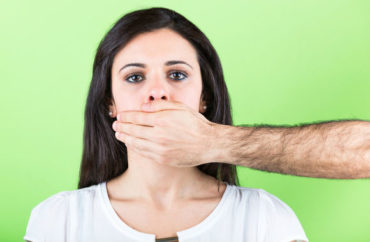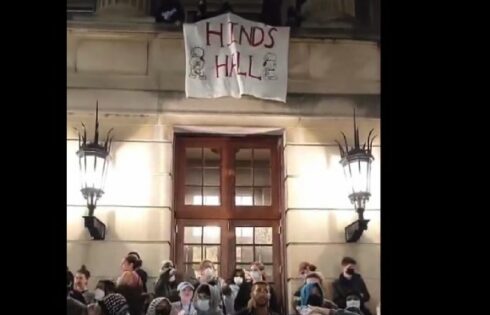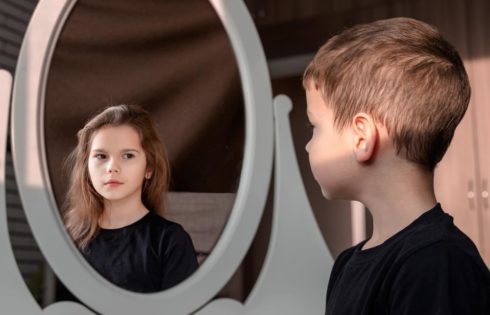
Expect punishment if you harm ‘mental’ health of ‘any other person’
Syracuse University tells students that it’s committed “to the principle that freedom of discussion is essential to the search for truth.” Its communications school even has the First Amendment emblazoned on the building (below).
When its audience is a local judge, however, the private university hedges.
In a legal response last month to a student’s lawsuit that alleges free speech violations by Syracuse, the university told the court that it does not actually grant students free speech.
If it determines that their speech threatens the “mental” health of “any other person,” Syracuse will punish students “irrespective of free speech implications,” the university told the New York Supreme Court in Onondaga County. (In New York State, supreme courts are trial courts.)
Citing its Student Conduct System Handbook, the university said its policy “expressly limits free expression” and “does not incorporate a right of free speech that is coextensive with the First Amendment.”
The university’s argument did not surprise Zachary Greenberg, an alum of its law school who helped push through a student government resolution that called on Syracuse to narrow a broad harassment policy.
Now a program officer and lawyer with the Foundation for Individual Rights in Education, Greenberg has catalogued Syracuse’s violations of freedom of expression going back to President Obama’s first term.
“Many students [don’t] know that Syracuse has these policies and has punished students for their expression in the past,” he told The College Fix in an email. “One of my goals [is] to bring awareness to this issue, because it affects every student’s ability to pursue their education.”
MORE: Judge rules Syracuse can ignore contract, punish students for free speech

Hearing panel rejected ‘most of’ his questions
The dispute at the heart of the lawsuit goes back to 2017, when the Office of Student Rights and Responsibilities asserted a number of punishable charges on a freshman Army ROTC student for “bias-related” comments.
It cited allegations that Zachary Langdon called women “second class citizens,” asked a black friend playing a rap song if it was “the black girl anthem,” and made a school-shooting joke out of frustration with four fire alarms in one night.
The office also said Langdon told a racy joke, propped trash cans outside of people’s dorm doors and referenced a swastika during a game of Quiplash, a multi-player app that asks players to give comedic responses to provoking prompts.
While admitting to some of the allegations, the student characterized most of the charges against him as “taken out of context,” some rooted in “hearsay” and others as untrue, according to the lawsuit, filed last summer.
After a December 2017 panel hearing, the office found Langdon guilty on all charges – even those lacking corroborating evidence – and suspended him indefinitely, he said.
Langdon accused the office of multiple procedural mishandlings, including failure to provide a fair and independent panel or maintain a written record of the hearing. He said it did not apply Syracuse’s free speech guaranty to the hearing process.
The university ignored its Student Bill of Rights by denying him the “ability to call, confront or question his accusers,” the lawsuit says. “He could only ask questions to the hearing panel, most of which they rejected.”
Langdon also questioned the qualifications of the panel that judged him, saying it handled the process in an “unfair and prejudicial” manner.
Panel members “receive virtually no legal training on the presumption of innocence, and reliability of evidence, the meaning of the burdens of proof, or the proper procedures for conducting an independent and fair hearing,” he claimed.
MORE: Syracuse rejects conservative club for pro-Constitution requirement
.@SyracuseU denies recognition to a student group, says conservative views and support of U.S. Constitution are ‘not inclusive.’
Coincidentally, the denial happened the same day Syracuse appeared on FIRE's "10 Worst Colleges for Free Speech" list.https://t.co/4zsmbIkd0t
— FIRE (@TheFIREorg) February 22, 2019
‘Harming free speech does damage to the intellectual rigor of universities’
Syracuse and Langdon disagree on the context of the university’s promise in the Statement of Student Rights and Responsibilities that all students “have the right to express themselves freely on any subject.”
Students are not allowed to limit the expression of others, it continues. They “have the responsibility to respect the right of all members of the University to exercise these freedoms.”
Langdon said the university violated its Code of Student Conduct and Process Manual by “failing to apply the free speech protections guaranteed to students in the SU Bill of Rights.”
The university’s explanation of its policies in the March legal response suggests it is far less committed to open discourse on campus than students might think.
Citing the punishability of any conduct that threatens “mental” health – which it does not define – Syracuse said its handbook does not provide “all the protections that would otherwise apply to governmental actors under the First Amendment to a private actor like the University.”
MORE: Syracuse drops allegations against student blogger after FIRE diss
Syracuse has long been on FIRE’s radar for its perceived suppression of speech in violation of its promises to students, as Greenberg made clear in a recent blog post.
He wrote that his alma mater “finally concedes that its free speech promises are worthless,” citing several incidents that FIRE has catalogued. It expelled a graduate student “for his comments about a racially charged remark in 2012,” investigated a law student in 2010 for running a “fake-news parody blog about life in law school,” and last year suspended fraternity pledges for up to two years for participating in satirical skits.
Syracuse’s legal response contradicts its internal policies, he said: It “cannot profess to respect student free speech while repeatedly penalizing free speech.”
Most of the universities that FIRE reviewed for its annual survey of speech codes have at least one such code, but Syracuse is in a league of its own, according to FIRE. It has twice appeared on FIRE’s worst schools for free speech, including this year.
“Free speech entails a set of values such as giving your intellectual adversaries the benefit of the doubt, engaging with opposing views, rejecting dogmatic arguments, and questioning your deepest held beliefs,” Greenberg told The Fix when asked about the potential ramifications of Syracuse’s argument.
“When universities disrespect these values, they are watering down the educational experience they provide to their students,” he said. “Harming free speech does damage to the intellectual rigor of universities, which renders students ill-prepared to engage with opposing ideas after they graduate.”
Neither Syracuse media relations nor the S.I. School of Public Communications, on whose building the First Amendment is emblazoned, responded to The Fix for comment.
MORE: Syracuse fires professor for disagreeing with speech-based expulsion
IMAGE: William Perugini/Shutterstock
Like The College Fix on Facebook / Follow us on Twitter






Please join the conversation about our stories on Facebook, Twitter, Instagram, Reddit, MeWe, Rumble, Gab, Minds and Gettr.